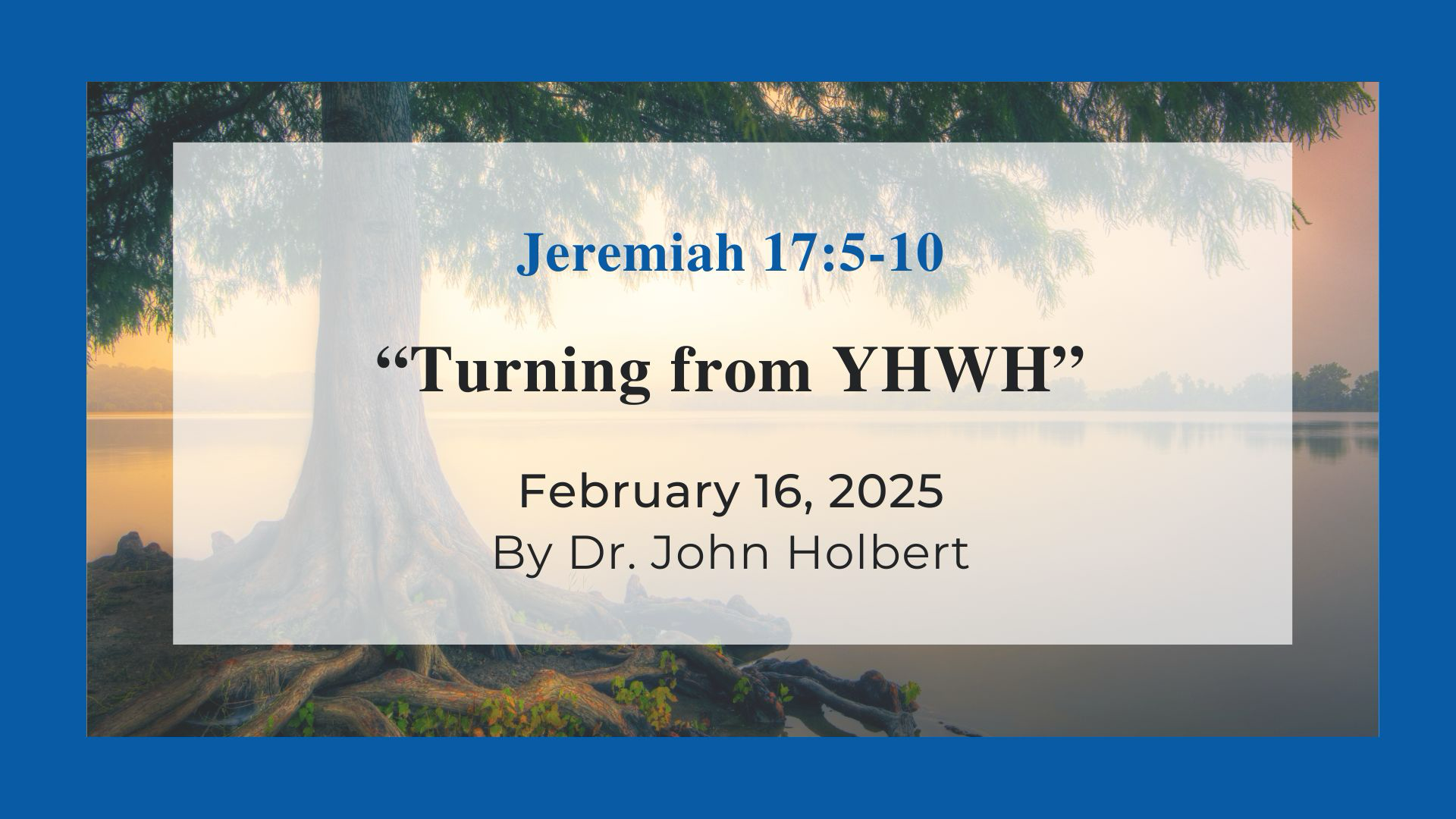Turning from YHWH Reflections on Jeremiah 17:5-10 for Epiphany 6, Year C
by John C. Holbert on Wednesday, January 15, 2025

The compilation of the book of Jeremiah is intensely complex. The “historical” introduction to the corpus, if it is indeed to be trusted historically, tells us that the prophet practiced his ministry from his call from YHWH in the 13th year of Josiah’s kingship over Judah (627BCE) down to the very end of the state of Judah at the hands of the Babylonians in 587BCE, after which he was dragged to Egypt by some of his disciples, apparently dying there. During his very long prophetic work, he made few friends, had no family, and suffered no end of rejection and anger, both from the kingly court and from rival prophets who claimed that Jeremiah was, in reality, no prophet of YHWH at all (Jer.28).
During those forty years, he witnessed the hopes of a Josianic reform, triggered by the discovery in the walls of a rebuilding temple something like the book of Deueteronomy, then the horrible death of the king in a futile attempt to stop the armies of Egypt from moving up the coast of the land, down to the Babylonian sack of the Holy City, the destruction of the temple and palace, and the removal of many major leaders to exile in Babylon. This caused the prophet to ask the question “why” in many and various ways. Why was all this tragedy visited on Judah? Why did the people, king and commoner alike, too often turn from the demands of their God and seek succor from foreign deities or from their own human power? Jeremiah, of course, asks the questions we still ask today: why do we seek to secure our lives without recourse to the God who loves us and who has offered to us safety and hope in a beloved community?
Jeremiah 17 is a parade example of Jeremiah’s search for an explanation for these probing questions. “The sin of Judah is written with an iron pen; with diamond point it is etched on their heart’s tablet, on the horns of their altars” Jer.17:1). In short, the main issue for Jeremiah is that Judean sin has brought calamity upon them. The content of that sin is multi-sided, consisting of the abuse of the poor and marginalized of the community, a common accusation of Israel’s prophets to be sure, but Jeremiah goes further in his search for Judah’s wrongdoing.
“Cursed are the warriors who trust in human beings, who find their strength in common flesh” (Jer.17:5). The word I have translated “warriors,” is often read more generally as “those (NRSV).” The Hebrew word is geber and is regularly employed in contexts of battle and struggle. It may well be that Jeremiah means both soldiers and common people alike. Anyone who places trust, he warns, in human beings and their frail flesh alone is cursed, that is, doomed to ignominious defeat, because to place trust there leads inevitably to “hearts turned away from YHWH” (Jer.17:5c). They are thus like “desert shrubs,” notoriously isolated in the vast wasteland of the Judean deserts, and “unable to see when good comes” (Jer 17:6). There is here a delightful sound pun in Hebrew: desert shrub is “ca’arar b’arbah.”
On the contrary, he continues, “Blessed are those (warriors) who trust in YHWH, whose trust is YHWH” (Jer.17:7). This is a most interesting formulation. The Bible normally asks us to “trust in” God, but rarely does it ask us to make YHWH our trust, calling us not only to trust in God, but even more to make that very trust the very God in whom we trust. If YHWH is our trust, then to trust in YHWH is inevitable and secure. We must not trust in human flesh, but only in YHWH who is nothing less than our trust itself.
Those who have such trust will be “like a tree planted by water (see Psalm 1), sending out its roots by the stream; it has no fear when heat comes; its leaves stay green” (Jer.17:8). The familiar metaphor announces that trusting YHWH, rather than in any humans, saves one from disaster and calamity. Would that Judah had listened!
But Jeremiah knows, as well as do we, “The heart is more devious than anything; it is wayward; who can understand it?” (Jer.17:9) We must be reminded that the “heart” is in Hebrew anthropology the place of will and intelligence, the equivalent of what we know as the brain, with the added sense of emotion that “heart” implies, though the deepest emotions the Hebrews assigned to the “guts”. Jeremiah asks with a certain anguish that question we often ask ourselves—just who can understand why the heart is wayward, or “perverse,” as NRSV has it?
All must remember, concludes Jeremiah in this probing text, “I, YHWH, test the heart, search the will to offer to all according to their ways, the just fruit of their actions” (Jer.17:10). There are divine consequences for those who put their trust in human beings, no matter how great they may be, no matter how impressive their flesh. One might well conclude that these thoughts arose for the prophet as he witnessed the end of Jerusalem, the collapse of the temple, the exile of the king and his court. Yes, he imagined, “the human heart is wayward above all things,” and too often is thoroughly incomprehensible. Only trust in YHWH in the end brings hope and possibility for the future, however barren and dark it currently appears.
